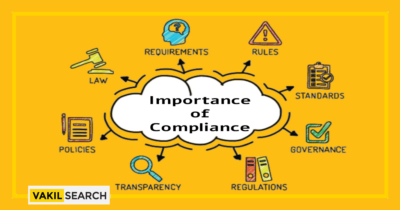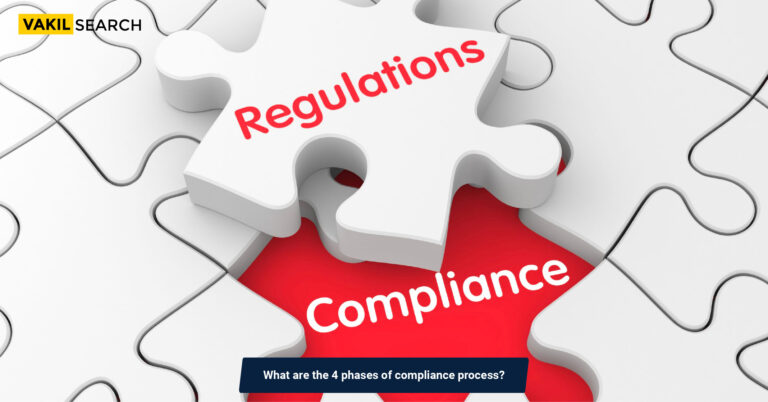A shot in the arm for ease of doing business came in the form of increased limits for classification as small & medium-sized companies (SMCs). This amendment follows a recent slew of changes made by the government in favour of LLPs.
Running any business is hard. It requires money, time, and determination. Besides this, there is a lot of paperwork including registration, GST filings, and others that are cumbersome. However, our team of experts at Vakilsearch will help you with all legal requirements, such as filing all the mandatory forms, suggesting the right lawyer for you (if you need one), or verifying your documents. Vakilsearch helps you to avoid penalties for not filing the required forms on time. Let’s see about LLP Compliance Checklist for India.
What Is an LLP?
Limited Liability Partnership (LLP) is a separate legal entity registered under the Ministry of Corporate Affairs (MCA) in India. To register an LLP, there should be two partners, with at least one of them need to be an Indian citizen and resident. The partners should take responsibility for maintaining a proper book of accounts, filing income tax returns, and filing an annual return with the Ministry of Corporate Affairs (MCA) every financial year.
Advantages of a Limited Liability Partnership:
- In an LLP, one partner is not answerable or liable for another partner’s misconduct or negligence
- The partners have the right to manage the business directly
- An LLP provides limited liability protection for the owners
- If the number of partners reduces less than 2, the sole partner can still find a new partner to fill the position
- Post incorporation, an LLP can have limitless partners
- If there is only one partner in an LLP, there is time to find a new one, without dissolution of the LLP
- It is a separate legal entity
- LLPs have assets and liabilities that are separate from that of the promoters
- An LLP can raise funds from partners, banks, and NBFCs.
All LLPs with the MCA and need a statement of accounts and annual returns for every financial year. Whether or not the LLP has done business or achieved profit filing a return is still mandatory. There are three compulsory compliances when you own an LLP.
- Filing of annual returns
- Books of accounts
- Filing of income tax returns
In an LLP, a person should file two types of MCA annual returns every financial year. The two forms are Form 8 and Form 11.
Form 8
Form 8 consists of the statements of account and solvency. You should file Form 8 along with the fee within 30 days from the end of six months of the financial year, i.e. October 30.
The fee is based on how much your LLP makes, and is broken down accordingly
| Contribution of LLP | Filing fees of Form 8 |
| Up to ₹1 lakh | ₹50 |
| ₹1,00,001 to ₹5,00,000 | ₹100 |
| ₹5,00,001 to ₹10 lakhs | ₹150 |
| ₹10 lakhs | ₹200 |
Two designated partners must sign the form digitally. Further, it must be certified by a chartered accountant, auditor or the accountant of the company. Form 8 consists of information related to the statement of assets of the LLP and liabilities and the statement of income and expenditure of the LLP.
There Are two Types in Form 8
- Part A – statement of solvency
- Part B – statement of accounts and statement of income & expenditure
You will have to pay the penalty of ₹100 a day if you have not filed this form.
Form 11
Form 11 consists of annual returns. The form should contain the complete details of all the partners, their contributions towards the company, etc. You should file Form 8 along with the fee, within 60 days of the financial year. The year ending for LLPs is 31 March of each year. Therefore, LLPs have to file the LLP Form 11 on or before 30 May every year.
Remember that you will be penalised if you don’t file LLP Annual Filing returns on or before the due date.
Filing of Income Tax
Limited liability partnerships (LLPs) that need to file Form 3CEB (LLPs that have entered into international transactions) can do their tax filings by 30 November. LLPs should file their income tax returns in Form ITR 5. The form could be submitted online via the income tax website with the help of the selected partner’s digital signature. LLP tax payments can be made in physical mode through chosen banks or e-payment mode.
Books of Accounts
All LLPs must maintain proper books of account on a cash basis or accrual basis. Each year, before 31 March, the report has to be properly submitted when required. The accounts books have to be presented in the registered office when needed. In the case of LLPs with a turnover of more than ₹40 lakhs or capital of over ₹25 lakhs, the accounts must be audited by a chartered accountant.
Any Limited Liability Partnership companies that do not obey the requirements of the Act can be punishable with a fine of a minimum of ₹25,000 and to a maximum of ₹5,00,000. Further, the designated partner could be punished with a penalty of ₹10,000 and ₹1 lakh for non-acquiescence.
Checklist for LLP Annual Compliance in India
Ensuring compliance with statutory requirements is pivotal for the seamless functioning of a Limited Liability Partnership (LLP) in India. The LLP annual compliance checklist encompasses essential activities to be completed within specified timelines:
LLP Annual Return Filing (Before May 30th):
File the LLP annual return before May 30th of each financial year to provide a comprehensive overview of the LLP’s operations and financial status.
LLP Account & Solvency Filing (Before October 30th):
Submit the LLP account and solvency statement before October 30th, reflecting the financial position and solvency of the LLP during the fiscal year.
Mandatory Income Tax Return Filing:
LLPs must file an income tax return each year, regardless of their income, profit, or loss, ensuring compliance with tax regulations.
Additional Compliance Requirements:
Adhering to MCA guidelines, LLPs must also file income tax returns and GST returns, completing the comprehensive set of mandatory compliance activities.
Tips for Staying on Top of LLP Company Compliance
In the fiercely competitive business landscape, maintaining an edge involves adeptly navigating LLP Company Compliance. Here are strategic insights to keep your firm ahead:
Prioritise Legal Understanding:
Begin by comprehensively grasping legal requirements during the LLP Company application. Stay informed on regulations, news, and guidelines established by governing authorities to ensure thorough compliance.
Document Management and Accuracy:
Maintain meticulous records of financial transactions, invoices, receipts, and bank statements. A systematic approach to documentation, including partnership agreements and annual returns, ensures readiness for any compliance scrutiny.
Tax Obligations Mastery:
Fulfilling tax obligations is paramount for an LLP Company. Stay well-versed with Goods & Services taxes (GST) and adhere to the specific requirements for your business. Keep a vigilant eye on deadlines to sidestep penalties and maintain fiscal compliance.
Stay Proactive and Informed:
Regularly update yourself on evolving regulations and industry standards. Being proactive and staying informed positions your LLP Company to navigate changes seamlessly, fostering a culture of perpetual compliance.
Consequence on Non-Compliance of LLP
Compliance for an LLP company in India is not merely a formality; it’s an inherent obligation for operational legitimacy. Failure to comply can have severe consequences, jeopardising financial health and the ability to operate. Here’s a glimpse of the potential repercussions:
Financial Penalties:
Non-compliance may result in substantial financial penalties. LLPs and their partners could face charges ranging from ₹10,000 to an amount exceeding ₹5,00,000, depending on the severity and duration of the non-compliance.
Application of LLP Act, 2008 – Schedule I:
The absence of a Limited Liability Agreement subjects LLPs to Schedule I of the Limited Liability Partnership Act, 2008. This underscores the importance of having a comprehensive agreement in place to avert potential legal implications.
Late Submission Consequences:
LLPs are required to submit e-forms 3 and 4 within 30 days of incorporation. Failure to meet this deadline can result in penalties of ₹100 per day, with additional charges accumulating. Timely submission is imperative to avoid unnecessary financial strain.
FAQs
What are the regulatory requirements for LLP?
Regulatory requirements for Limited Liability Partnerships (LLP) involve filing annual returns, maintaining financial records, conducting audits, and adhering to the guidelines outlined by the Ministry of Corporate Affairs. Compliance with these regulations ensures the smooth functioning and legality of an LLP.
What is the due date for the LLP compliance checklist?
The due date for LLP compliance checklist typically falls on October 30th of each financial year. This checklist includes essential tasks like filing annual returns and financial statements, ensuring compliance with statutory requirements, and updating necessary records with the Ministry of Corporate Affairs.
What is the last date for LLP compliance?
The last date for LLP compliance is generally October 30th of each financial year. During this period, LLPs must complete various regulatory tasks, including filing annual returns, maintaining financial records, and fulfilling statutory obligations to stay compliant with legal requirements.
How much does a CA charge for LLP registration?
The cost for LLP registration with a Chartered Accountant (CA) varies based on factors like the complexity of the registration process, documentation involved, and the CA's fee structure. Generally, fees range from a few thousand to several thousand rupees, depending on the CA's expertise and services offered.
What is the penalty for non audit of LLP?
Non-audit of an LLP may result in penalties. As per regulatory guidelines, LLPs that exceed specified turnover thresholds are required to undergo a mandatory audit. Failure to comply may lead to penalties ranging from a fixed amount to a percentage of turnover, depending on the duration and severity of non-compliance.
Read More:-










